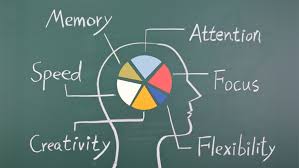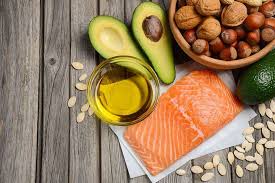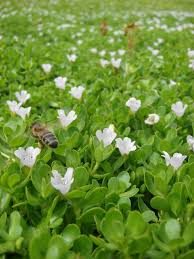A mild decline in learning and memory is a normal part of aging, and opinions will vary on what’s “normal” or not. But generally as we get older we tend to be a bit more forgetful, or it becomes harder for us to learn new things or concentrate. There are a host of things that can contribute to this besides aging alone. Some things that can effect our cognition are medications, diet, environment, and genetics (which drugs, diet, and environment can influence changes in out genes).

Normal cognitive decline consists of mild changes in the rate of information processing and new learning, as well as mild changes in memory. Mild Cognitive Impairment (MCI) is a decrease in cognitive function while still being able to function in daily life. Dementia, now called Major Neurocognitive Disorder (MND), is when loss of cognitive function impacts a person’s ability to function independently. Dementia, or MND, is postulated to affect 5% of people 65 years of age, and increases to as high as 50% in people 85 years of age and older.
Drugs that are thought to impair cognition include antihistamines, chemotherapy, anticonvulsants, analgesics, sedative-hypnotics, psychotropics, anticholinergics, muscle relaxants, and statin drugs. That’s a pretty broad list of commonly prescribed drugs.
So what are some ways we can approach slowing down cognitive decline?
I’m currently studying Traditional Chinese Medicine (TCM), and according to TCM cognitive health is governed by 3 different organs: the heart, the spleen, and the kidneys. The heart nourishes the mind – that part that thinks coherently and remembers long-term events. Many people with MND retain some aspects of long-term memory, even if spotty. The spleen houses the intellect – the ability to concentrate, study, and memorize. Maintaining proper gut function throughout life can strengthen spleen function into the aging years. The kidneys house will-power, and produce bone marrow (which nourishes the brain); short-term memory also stems from the kidneys. Adrenal function is linked to kidney health, and deficient kidney Qi (pronounced as ‘Chee’; in TCM our Qi is essentially our life force) is often linked to MND.

Acupuncture has a profound effect on the brain.
Our diet and lifestyle, of course, can dramatically prevent and treat cognitive decline. Regular exercise, adequate sleep, and an active mental and social life are simple approaches to slowing cognitive decline. Our diet can be more difficult due to the wealth of information out there on what a healthy diet should be. I’ll point out some commonly agreed on foods and supplements but I advise speaking with me or another Center for Natural Healing physician before starting any.
Supplements that have been popular and are well researched for healthy brain function include omega-3 fatty acids and lecithin. Both of these come from healthy fat sources such as eggs, seafood, and meat. Speaking of eggs, eggs are high in choline as well. Choline is the precursor to the neurotransmitter acetylcholine. Loss of cholinergic neurons is associated with impaired cognitive function, particularly memory loss and Alzheimer disease (AD). Other sources of healthy fats include, fish, flaxseeds, and chia seeds. A general consensus is that diets low in sugar and refined carbohydrates are best.

Some of the more commonly used amino acids include acetyl-L-carnitine (or L-carnitine), phosphatidylserine, phosphatidylcholine, inositol, N-acetylcysteine, S-adenosylmethionine, L-glutamine, and L-tyrosine. Again, I wouldn’t advise taking these unless you talk to your doctor or me about dosage and interactions.
I’m a huge advocate of herbs! They can be very safe and very effective. And luckily there are lots of herbal options. Some popular herbs helping with cognitive function include rosemary, ginseng, turmeric, and many, many more. I include these herbs cause they’re easy to add to food dishes, but there are lots that can be added to tincture formulas (I like to call them potions). Herbs can increase neurotransmitters, help grow new brain cells, increase blood flow to the brain, and reduce oxidative stress in the brain. For instance, Bacopa monnieri is an herb fromsouthern India known to prevent aging, reestablish youth, prevent disease, promote health and longevity, and strengthen life, brain, and mind. It increases the neurotransmitter acetylcholine which is essential for learning and memory.

Bacopa
To schedule an appointment with Dr. Whitney call the Center for Natural Healing at 480.970.0077 or contact him at https://innatehealthcare.org/contact
By Travis Whitney, NMD, MSc
References
Bekinschtein P, Cammarota M, Katche C, et al. BDNF is essential to promote persistence of long-term memory storage. Proc Natl Acad Sci U S A. 2008;105(7):2711-2716.
Brondino N, Re S, Boldrini A, et al, Curcumin as a therapeutic agent in dementia: a mini systematic review of human studies. ScientificWorldJournal. 2014;2014:174282.
Calabrese C, Gregory WL, Leo M, et al. Effects of a standardized Bacopa monnieri extract on cognitive performance, anxiety, and depression in the elderly: a randomized, double-blind, placebo-controlled trial. J Altern Complement Med. 2008;14(6):707-713.
Diseases & Conditions: Dementia. Cleveland Clinic Web site. https://my.clevelandclinic.org/health/diseases_conditions/hic_Types_of_Dementia. Accessed September 15, 2015.
Khalsa KP, Tierra M. The Way of Ayurvedic Herbs: A Contemporary Introduction and Useful Manual for the World’s Oldest Healing System. Twin Lakes, WI: Lotus Press; 2008.
Mazza M, Capuano A, Bria P, Mazza S. Ginkgo biloba + donepezil: a comparison in the treatment of Alzheimer’s dementia in a randomized placebo-controlled double-blind study. Eur J Neurol. 2006;13(9):981-985.
Mishra S, Palanivelu K. The effect of curcumin (turmeric) on Alzheimer’s disease: An overview. Ann Indian Acad Neurol. 2008;11(1):13-
Poly C., et al. The relation of dietary choline to cognitive performance and white-matter hyperintensity in the Framingham Offspring Cohort. American Journal of Clinical Nutrition. 2011. Dec;94(6):1584-91
Tierra L. Healing with the Herbs of Life. Berkeley, CA: Crossing Press; 2003.
Wang R, Yan H, Tang XC. Progress in studies of superzine A, a natural cholinesterase inhibitor from Chinese herbal medicine. Acta Pharmacol Sin. 2006;27(1):1-26.
Witte AV, Kerti L, Margulies DS, Floel A. Effects of resveratrol on memory performance, hippocampal functional connectivity, and glucose metabolism in healthy older adults. J Neurosci. 2014;34(23):7862-7870.
Wu A, Ying Z, Gomez-Pinilla F. Dietary curcumin counteracts the outcome of traumatic brain injury on oxidative stress, synaptic plasticity, and cognition. Exp Neurol. 2006;197(2):309-317.




